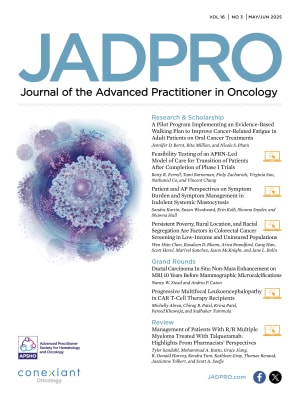Abstract
Abstract
In past decades, oral formulations of medications used in the treatment of cancer have become increasingly prevalent. This can be a significant benefit for patients, as it eliminates the need for frequent trips to the infusion center and reduces travel and time away from home, work, and family members. However, making cancer treatments available in oral form transfers most of the responsibility for correct administration of the drug to the patient. With this transfer of responsibility comes the need to support patients in their adherence to the directed regimen. Patient education and communication are crucial. Although helping patients by encouraging adherence should be a team effort, the advanced practitioner is perfectly positioned to be sure that patients receive consistent, tailored support.







